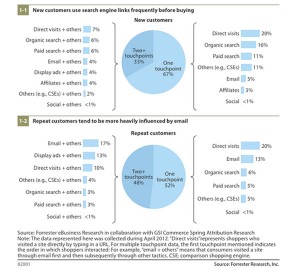I wrote earlier this morning about a promotion by Special K that gave people freebies if they tweeted about the product at the stall and how it was pretty unlikely (imo) to gain them many long-term customers. It underlines the difficult nature of trying to prove the link between social media and product purchases. Indeed, the difficulty in proving this link has caused Facebook to downplay the importance of measuring click throughs on their ads this week, in favour of wider brand building metrics.
Social media is not a sales tool
All of which surely must underline the fact that social media isn’t really a platform for generating sales. It has many tremendous benefits in terms of customer support, innovation, and yes, even brand building, but generating sales is really not its forte. Don’t believe me? Have a look at the latest paper to be released by Forrester Research.
They investigated 77,000 online purchases and found that just 1% of them could be attributed directly to social sites. As a headline, that’s not great. Lets delve deeper.
 The researchers investigated the 77,000 purchases during the first two weeks of April this year. The aim of the study was to find out exactly how shoppers interacted with various online channels, such as search, social and email, before going on to make their purchase.
The researchers investigated the 77,000 purchases during the first two weeks of April this year. The aim of the study was to find out exactly how shoppers interacted with various online channels, such as search, social and email, before going on to make their purchase.
As you can see from the chart to the right, the most common ways of arriving at a purchase point for new customers were via direct visits (20%), organic search (16%) and then paid search (11%). Social represented less than 1%.
Ok you might say, but repeat customers have the brand loyalty and must hang out on social sites to get latest offers etc. Not really. For repeat customers, email gets a higher response, with 30% coming from that route (13% after reading the email and 17% after seeing the email and interacting with other marketing forms), with other channels like organic and paid search following depending on whether there was one or two touch points involved. Again, though, social represented less than 1% of the path leading to a direct sale.
Of course there are always some important caveats to consider. For instance the research doesn’t state whether the social platforms for the companies being monitored were set-up to drive sales. If they weren’t and email/search were, then it’s hard to really compare the two fairly.
What is clear however is that at this moment in time, it seems that most social activity is not directly leading to sales. That in itself isn’t a bad thing, as I believe that at the moment social is much better geared to delivering value in other ways. It’s important however that:
- you have a means of measuring the ROI of your social media work, even if it isn’t aimed at generating sales
- your senior managers are aware of this metric and aren’t expecting it to be generating lots of sales
Great read! I believe that more companies will begin to directly reward consumers to promote their services/products. Solavei is a prime example as they have integrated their marketing message directly to social media platforms. Customers, me included, are directly being rewarded for people who sign up for Solavei's service through their recommendation. The service is by invite only so it gives a greater incentive to share what Solavei is all about.
What are your thoughts on that approach?
Hi Steven, I hadn't heard of Solavei before your comment. Is it akin to an affiliate program they're running?
Think they're the company he's promoting 😉
WE believe Social Media has great potential for generating sales in the near future. It is currently a great way to engage with your market, provide better CRM, gain insights into what your market is talking about, & gain brand exposure. It is a stepping stone along the from marketing to making a sale. Use Social Media to open a sale [generate a lead] but use traditional sales methods to close the sale.
Interesting article – puts thIngs into perspective
Steve Kavetsky
Co-Founder/Pres.
AgooBiz.com // The Social Commerce Network
“WE work greater than me”